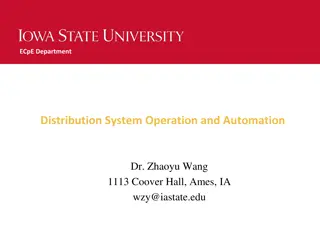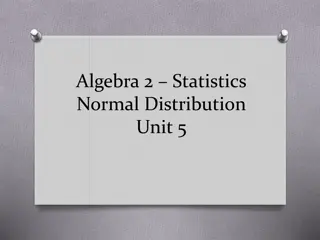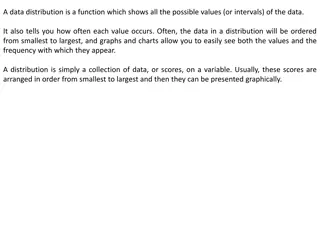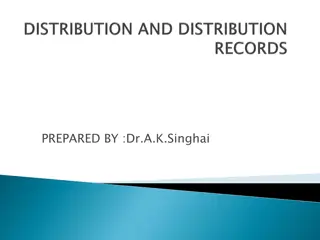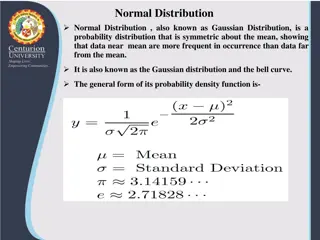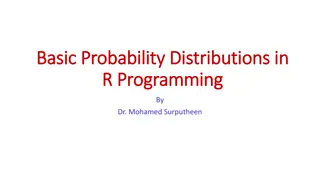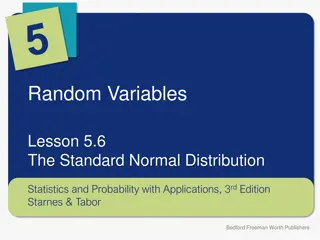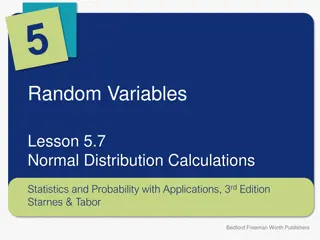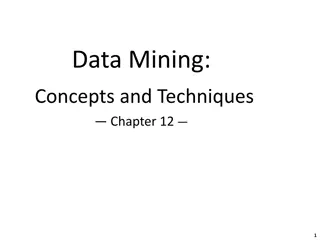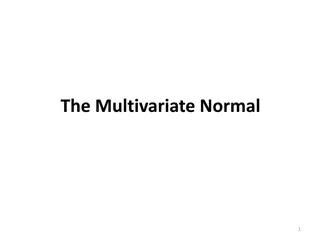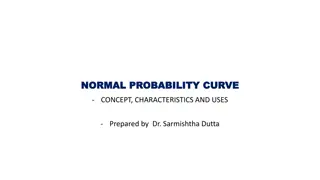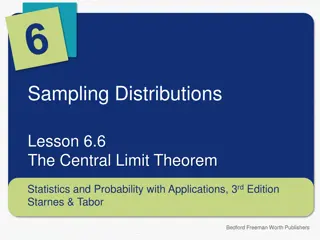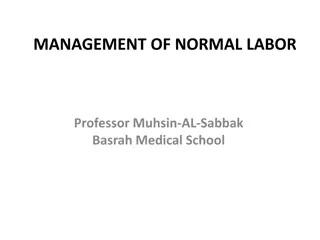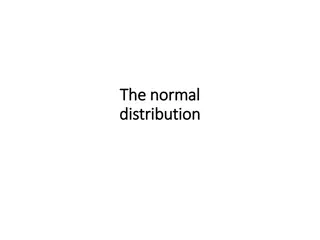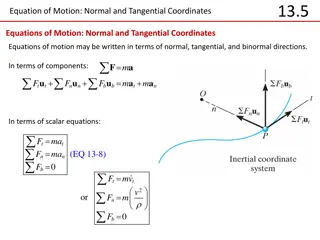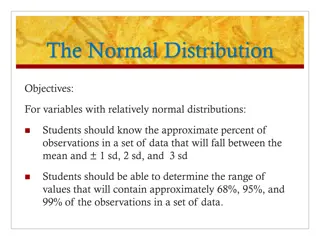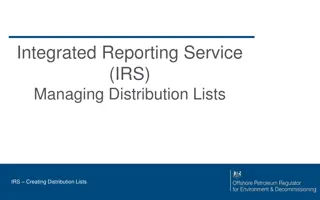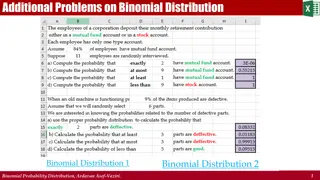Power Distribution in Data Centers Overview
Power distribution and equipment play crucial roles in commercial data center infrastructure, ensuring reliable and efficient operations. Adequate power routing from the grid or generators to data center equipment is vital for stable operations, data integrity, and performance maintenance. This incl
4 views • 19 slides
Physical Distribution
Physical distribution is a critical aspect of business operations involving the planning, implementation, and control of the flow of goods from origin to consumer. Philip Kotler and William J. Stanton have defined physical distribution as a process of managing the movement of goods to meet consumer
0 views • 8 slides
Effective Management of Transportation and Distribution in the Supply Chain
Understanding the methods to optimize the supply chain through inventory management, basic functions of transportation and distribution management, distribution strategies, importance of creating visibility in transportation and distribution activities, and the role of technology in enhancing operat
6 views • 27 slides
Distribution System Operation and Automation Overview
Distribution system operation involves various switching activities like restoration after outages, substation maintenance, load transfers, and more. A midsize US utility typically executes 10 to 20 switching orders daily. Distribution automation (DA) aims to improve supply reliability and efficienc
14 views • 36 slides
Understanding Normal Distribution in Statistics Education
Lesson resources for teachers to teach students about analyzing and understanding normal distribution in statistics. Includes learning standards, agenda, presentation, vocabulary activities, and additional resources. Emphasizes using mean and standard deviation to fit data to a normal distribution,
10 views • 23 slides
Understanding Normal Conditions of Use for New Propulsion Technologies in Vehicles
Explore the concept of normal conditions of use for vehicles with new propulsion/charging technologies. Learn how to assess and define normal conditions, operating modes, worst case scenarios, and overview of current technologies. Discover the approach to measure normal conditions and testing requir
1 views • 8 slides
Understanding the Significance Testing Process for Population Means
Learn how to test claims about population means, including checking conditions, calculating test statistics, finding P-values, and understanding t-distributions and degrees of freedom. This lesson covers the Random and Normal/Large Sample conditions for significance tests, the modeling of standardiz
0 views • 10 slides
Normal Flora of Human Body
Normal flora, comprising bacteria and fungi, are beneficial residents of specific body sites like the skin, colon, and vagina. These organisms, known as commensals, play a vital role in maintaining a healthy microbial balance. The internal organs are usually sterile, while different types of normal
2 views • 16 slides
Understanding Multinomial Distribution in Statistical Analysis
Multinomial Distribution is a powerful tool used in statistical analysis to model outcomes of events with multiple categories. This distribution is applied to scenarios where each trial has several possible outcomes, and the sum of probabilities of all outcomes is equal to 1. By defining random vari
0 views • 8 slides
Key Management and Distribution Techniques in Cryptography
In the realm of cryptography, effective key management and distribution are crucial for secure data exchange. This involves methods such as symmetric key distribution using symmetric or asymmetric encryption, as well as the distribution of public keys. The process typically includes establishing uni
1 views • 27 slides
Understanding Process Costing in Manufacturing Industries
Process costing is a widely used method in mass production industries like steel and chemicals. It involves accumulating costs process-wise for standardized products resulting from sequential operations. Essential characteristics include continuous production, standardized products, and handling nor
1 views • 18 slides
Understanding Data Distribution and Normal Distribution
A data distribution represents values and frequencies in ordered data. The normal distribution is bell-shaped, symmetrical, and represents probabilities in a continuous manner. It's characterized by features like a single peak, symmetry around the mean, and standard deviation. The uniform distributi
1 views • 23 slides
Drug Product Distribution Procedures and Records
Written procedures and distribution records are crucial for the efficient distribution of drug products. Procedures should prioritize the distribution of the oldest approved stock first and enable easy recall if necessary. Distribution records must be maintained and indexed for accountability. Diffe
0 views • 10 slides
Understanding Normal Distribution and Its Business Applications
Normal distribution, also known as Gaussian distribution, is a symmetric probability distribution where data near the mean are more common. It is crucial in statistics as it fits various natural phenomena. This distribution is symmetric around the mean, with equal mean, median, and mode, and denser
1 views • 8 slides
Understanding Binomial Distribution in R Programming
Probability distributions play a crucial role in data analysis, with the binomial distribution being a key one in R. This distribution helps describe the number of successes in a fixed number of trials with two possible outcomes. Learn about the properties, probability computations, mean, variance,
3 views • 30 slides
Understanding the Standard Normal Distribution in Statistics
Exploring the significance of normal distributions in statistics, this lesson covers the 68-95-99.7 rule, using Table A to find probabilities and z-scores, properties of normal curves, and the standard normal distribution. Key concepts include the mean, standard deviation, and how to standardize var
4 views • 9 slides
Understanding Normal Distribution Calculations in Statistics
Exploring normal distribution calculations in Statistics involves calculating probabilities within intervals and finding values corresponding to given probabilities. This lesson delves into the application of normal distribution to determine probabilities of scoring below a certain level on tests an
1 views • 13 slides
Understanding Normal Distribution in Probability
Explore the properties and characteristics of the normal distribution, including the mode, symmetry, inflection points, and the standard normal distribution. Learn how to use standard normal tables to find probabilities and areas under the curve. Practice using examples to calculate probabilities ba
1 views • 35 slides
Understanding Outlier Analysis in Data Mining
Outliers are data objects that deviate significantly from normal data, providing valuable insights in various applications like fraud detection and customer segmentation. Types of outliers include global, contextual, and collective outliers, each serving distinct purposes in anomaly detection. Chall
0 views • 44 slides
Understanding the Normal Microbial Flora of the Human Body
The normal microbial flora, also known as the indigenous microbiota, inhabit various areas of the human body such as the gastrointestinal tract, respiratory tract, genitourinary tract, and skin. They play a crucial role in maintaining health and can re-establish themselves when disturbed. While resi
0 views • 22 slides
Understanding Multivariate Normal Distribution and Simulation in PROC SIMNORM
Explore the concepts of multivariate normal distribution, linear combinations, subsets, and variance-covariance in statistical analysis. Learn to simulate data using PROC SIMNORM and analyze variance-covariance from existing datasets to gain insights into multivariate distributions. Visualize data t
0 views • 16 slides
Understanding and Managing Normal.dotm in Microsoft Word
Learn about Normal.dotm in Microsoft Word, the default template for new documents. Find out how to locate, create, modify, and deal with corrupted Normal.dotm files. Explore the importance of Normal.dotm in customizing your Word documents efficiently.
0 views • 19 slides
Understanding the Normal Probability Curve
The Normal Probability Curve, also known as the normal distribution, is a fundamental concept in statistics. It is symmetric around the mean, with key characteristics such as equal numbers of cases above and below the mean, and the mean, median, and mode coinciding. The curve's height decreases grad
0 views • 10 slides
Understanding Normal and Abnormal Behavior: Perspectives and Definitions
Normal behavior varies from person to person and society, influenced by individual preferences and societal norms. Abnormal behavior is characterized by an inability to function effectively or personal discomfort. The concept of normality and abnormality in psychology raises complex questions about
2 views • 8 slides
Understanding the Central Limit Theorem in Statistics
This lesson covers the Central Limit Theorem, which states that the sampling distribution of a sample mean becomes approximately normal as the sample size increases, regardless of the population distribution. It explains how the distribution of sample means changes shape and approaches a normal dist
0 views • 7 slides
Understanding Normal Forms in Propositional Logic
Explore the concept of normal forms in propositional logic, where each formula has a unique truth-value function. Learn about equivalence of formulas, determining normal forms, and canonic forms like Disjunctive Normal Form (DNF) and Conjunctive Normal Form (CNF). Discover how to find canonic forms
1 views • 22 slides
Understanding Chi-Square and F-Distributions in Statistics
Diving into the world of statistical distributions, this content explores the chi-square distribution and its relationship with the normal distribution. It delves into how the chi-square distribution is related to the sampling distribution of variance, examines the F-distribution, and explains key c
0 views • 23 slides
Understanding Normal Parturition: The Stages and Processes
Normal parturition, also known as childbirth, involves several stages including uterine contractions, cervix dilatation, fetal positioning, and the weakening of the placental connection. The process gradually prepares the birth canal for delivery, with the fetus assuming a specific position for birt
1 views • 19 slides
Probability and Normal Distribution Exercises
Solving exercises related to normal distribution and probability, including calculating probabilities based on mean and standard deviation, determining minimum guaranteed mileage for a tire company, and interpreting test scores. Utilizes data on IQ test scores and tire mileage to illustrate concepts
0 views • 5 slides
Comprehensive Guide to the Management of Normal Labor by Professor Muhsin-AL-Sabbak
Understanding the management of normal labor is crucial for healthcare professionals. This comprehensive guide covers the definition of normal vaginal delivery, diagnosis of labor, stages of labor, phases of labor, and the use of tools like partogram and cardiotocography to monitor progress. Profess
0 views • 9 slides
Understanding Normal Labour in Pregnancy
Labour is the natural process of expelling a mature foetus from the uterus. Criteria for normal labour include spontaneous expulsion of a single, mature foetus within a reasonable time frame without complications. Various theories explain the onset of labour, such as hormonal factors and mechanical
0 views • 35 slides
Understanding Normal Distribution in Statistical Problems
Explore various scenarios involving normal distributions, such as calculating probabilities, determining population percentages, estimating standard deviations, and analyzing ranges of values. Practical examples include math test scores, rattlesnake lengths, car speeds, jelly bean quantities, and mo
0 views • 29 slides
Equations of Motion in Normal and Tangential Coordinates
Equations of motion can be expressed in terms of normal, tangential, and binormal directions. The normal and tangential components play crucial roles in describing the motion of an object. Through scalar equations and component representations, these equations help analyze forces and acceleration in
0 views • 8 slides
Understanding the Anderson-Darling Normality Test
Conducting the Anderson-Darling Normality Test helps determine if a set of continuous data follows a normal distribution. The test involves comparing the sample data distribution with a standard normal distribution and evaluating the p-value to either accept or reject the null hypothesis. By collect
0 views • 5 slides
Understanding the Normal Distribution in Data Analysis
The normal distribution, also known as the bell-shaped or Gaussian distribution, is defined by the mean and standard deviation of quantitative data. It helps determine the range of values containing specific percentages of observations. Identifying frequency, probability, mean, and the relationship
0 views • 19 slides
Comprehensive Lesson on Distribution Planning and Setup
This detailed lesson plan covers essential aspects of distribution systems, planning, setups, layouts, and actors involved in the distribution cycle. Participants will learn about distribution types, considerations, and evaluation criteria to ensure successful distribution operations. The session in
0 views • 22 slides
Managing Distribution Lists in Integrated Reporting Service (IRS)
Integrated Reporting Service (IRS) allows users with Notification Submitter privileges to create distribution lists to inform interested parties about notifications submitted. Creating distribution lists saves time by eliminating the need to repeatedly enter email addresses, ensuring all relevant pa
0 views • 5 slides
Distribution Functions & Examples in Statistics
Explore distribution functions in statistics including binomial, Poisson, exponential, and normal distributions. Examples demonstrate calculations for probabilities, means, variances, and using distribution approximations. Understand concepts through practical scenarios like airplane hits, coin flip
0 views • 15 slides
Understanding Binomial Distribution: Examples and Visualizations
Explore various problems and examples related to the binomial distribution, including calculating probabilities, approximations using Poisson distribution, and visual representations. Discover how binomial distribution tends towards normal under different conditions and learn how to solve problems u
0 views • 9 slides
Understanding Displacement, Deformation, and Normal Strain in Mechanics of Materials
Displacement and deformation in materials play a crucial role when loads are applied, leading to normal strain. This lecture discusses the concepts of displacement, deformation, and strain, covering topics such as types of strain, strain units, normal strain calculations, and the orientation of norm
0 views • 7 slides



